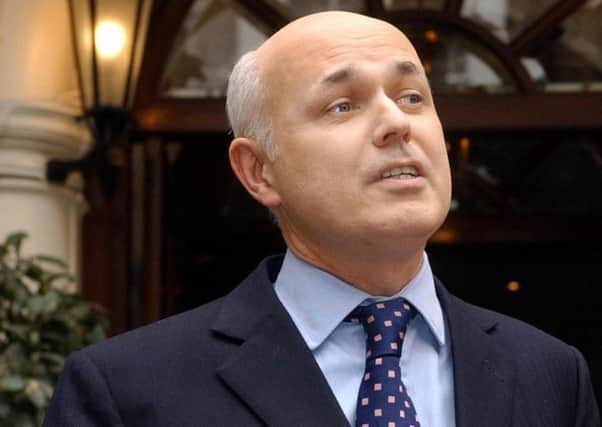Poverty warning over child benefits cut plan


Civil servants at the Department for Work and Pensions (DWP) have been told by Iain Duncan Smith to draw up a model on the impact of cutting child benefit from £20.70 a week to £13.70 for the first child.
The proposal, drafted in preparation for the emergency Budget in July, would save the UK government £2.5bn a year, according to the Institute of Fiscal Studies.
Advertisement
Hide AdAdvertisement
Hide AdHowever, families would lose out on £360 a year. The DWP is simultaneously looking at proposals to limit the benefits to just two children, which would save the government around £1bn annually, but larger families would lose £712 a year for every child after their second.
The proposals, which come as a welfare reform “tracking study” published today reveals that many people are living in constant fear of more benefits cuts, are said to be designed to encourage parents to base family planning decisions on what they can afford rather than relying on state support.
Mr Duncan Smith has pursued a personal mission to reform welfare by providing help and support for people to get back to work, which stemmed from a visit to Easterhouse in Glasgow that inspired him to found the Centre for Social Justice.
A source said: “This will be about achieving behaviour change. With two children, you send a message where people have to think, ‘Can I afford another child?’
“If you are on benefits and know the state will support you for the next child and the next, you are not facing the same decisions.”
The idea has been denounced by SNP ministers who say it strengthens the argument for devolving more welfare powers to Scotland over and above those due to be debated today in the second reading of the Scotland Bill.
A Scottish Government spokesman said: “These alarming proposals from the Department for Work and Pensions would hit families hard.
“The UK government’s austerity agenda and benefit cuts are having a very damaging effect on people in Scotland. Their approach is slashing the incomes of some of our poorest households and pushing 100,000 children into poverty.”
Advertisement
Hide AdAdvertisement
Hide AdLabour’s shadow Scottish secretary Ian Murray said: “For months Tory ministers have refused to rule out cutting child benefit and tax credits to fill the £12bn black hole in the welfare budget.
“And today we’ve learnt that Iain Duncan Smith has ordered civil servants to draw up plans to cut child benefit which would mean millions of working families losing out.
“David Cameron and George Osborne must come clean with the public about their plans to cut child benefit and child tax credits.”
The proposals for child benefit change come after the coalition government limited the benefit for families in which at least one parent earned more than £50,000, with the amount slowly reducing to nothing when one earner was on £60,000 or more.
The proposal also comes as Mr Osborne has told Cabinet ministers that he wants 5 per cent savings from each department apart from protected areas including health, international aid and schools.
The Tories have already committed to reducing housing benefit by preventing people under the age of 21 claiming it, while they will bring down the household benefit cap from £26,000 to £23,000.
However, these measures mean Mr Duncan Smith still needs to find £10.5bn of savings.
The latest proposals for welfare cuts come as a study raises concerns about the impact on people’s lives. The welfare reform tracking study, which looks at ongoing changes to working age benefits, revealed all respondents, including those in work, found themselves in very difficult financial situations and therefore felt an underlying sense of “precariousness”.
Advertisement
Hide AdAdvertisement
Hide AdThe study claimed many were anxious that changes to their circumstances or entitlements would push them into crisis situations.
In addition to this, many participants said they received poor and sometimes conflicting communications from benefits agencies and that there was a lack of clarity over information that was provided, bringing extra stress and uncertainty.
On the fear of the impact of further cuts, one respondent told the study: “It’s always in the back of your mind that it’s coming, and it’s going to have to be dealt with.
“And the constant moving – I wish when they said they were doing it two years ago they just got on with it, rather than drag it out and keep moving it and moving it … who the hell knows when it’s coming? But it’s been a constant hassle for people all this time. Very unfair.”
Another said: “You can’t say, well, if I do this I’ll be OK for the next year. You cannot know that, because things are changing so often, which makes it hard to relax.”